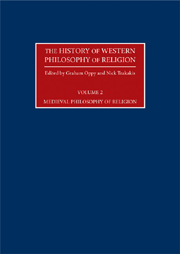Book contents
- Frontmatter
- Contents
- Editorial Introduction
- Contributors
- 1 Medieval Philosophy of Religion: An Introduction
- 2 Boethius
- 3 Johannes Scottus Eriugena
- 4 Al-Farabi
- 5 Avicenna (Ibn Sina)
- 6 Anselm of Canterbury
- 7 Al-Ghazali
- 8 Peter Abelard
- 9 Bernard of Clairvaux
- 10 Averroes (Ibn Rushd)
- 11 Moses Maimonides
- 12 Roger Bacon
- 13 Thomas Aquinas
- 14 John Duns Scotus
- 15 William Ockham
- 16 Gersonides
- 17 John Wyclif
- 18 Nicholas of Cusa
- 19 Erasmus of Rotterdam
- Chronology
- Bibliography
- Index
16 - Gersonides
- Frontmatter
- Contents
- Editorial Introduction
- Contributors
- 1 Medieval Philosophy of Religion: An Introduction
- 2 Boethius
- 3 Johannes Scottus Eriugena
- 4 Al-Farabi
- 5 Avicenna (Ibn Sina)
- 6 Anselm of Canterbury
- 7 Al-Ghazali
- 8 Peter Abelard
- 9 Bernard of Clairvaux
- 10 Averroes (Ibn Rushd)
- 11 Moses Maimonides
- 12 Roger Bacon
- 13 Thomas Aquinas
- 14 John Duns Scotus
- 15 William Ockham
- 16 Gersonides
- 17 John Wyclif
- 18 Nicholas of Cusa
- 19 Erasmus of Rotterdam
- Chronology
- Bibliography
- Index
Summary
Levi ben Gershom, also called Gersonides (1288–1344), has emerged in recent years as one of the most significant and comprehensive medieval Jewish philosophers. He has been constantly quoted (even if only to be criticized), and, through the works of Hasdai Crecas and others, Gersonides' ideas have influenced such thinkers as Gottfried Wilhelm Leibniz (see Vol. 3, Ch. 13) and Baruch Spinoza (see Vol. 3, Ch. 11). Emphasizing Gersonides' “religious rationalism in Judaism”, Seymour Feldman describes Gersonides as one who “has taken seriously the fact that he has reason, who believes that this faculty is God-given, and who attempts to understand God with this instrument” (Gersonides 1984: 52). Attempting to show that philosophy and Torah or reason and revelation are co-extensive, Gersonides is a philosophical optimist who believes that reason is fully competent to attain all the important and essential truths in religion. And yet, at the same time, perhaps no other medieval Jewish philosopher has been so maligned over the centuries as Gersonides. Indeed, his major philosophical work Milhamot Ha-Shem (Wars of the Lord; hereafter Wars) was called ‘Wars against the Lord’ by one of his opponents, and was depicted as a radical rejection of traditional Jewish tenets.
- Type
- Chapter
- Information
- The History of Western Philosophy of Religion , pp. 209 - 222Publisher: Acumen PublishingPrint publication year: 2009
- 1
- Cited by

